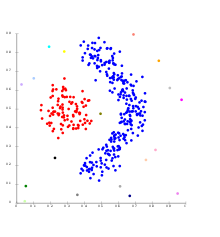
Back هندسة المعلومات Arabic Information Engineering Danish Information Engineering German مهندسی اطلاعات (رشته) FA Ingegneria dell'informazione Italian データ中心アプローチ Japanese Information engineering Dutch Engenharia informática Portuguese Inxhinieria e informacionit SQ اطلاعی ہندسیات UR
Information engineering is the engineering discipline that deals with the generation, distribution, analysis, and use of information, data, and knowledge in electrical systems.[1][2][3][4][5] The field first became identifiable in the early 21st century.

The components of information engineering include more theoretical fields such as Electromagnetism, machine learning, artificial intelligence, control theory, signal processing, and microelectronics, and more applied fields such as computer vision, natural language processing, bioinformatics, medical image computing, cheminformatics, autonomous robotics, mobile robotics, and telecommunications.[1][2][5][6][7] Many of these originate from Computer Engineering , as well as other branches of engineering such as electrical engineering, computer science and bioengineering.

The field of information engineering is based heavily on Engineering and mathematics, particularly probability,statistics, calculus, linear algebra, optimization, differential equations, variational calculus, and complex analysis.
Information engineers often[citation needed] hold a degree in information engineering or a related area, and are often part of a professional body such as the Institution of Engineering and Technology or Institute of Measurement and Control.[8][9][10] They are employed in almost all industries due to the widespread use of information engineering.
- ^ a b "2009 lecture | Past Lectures | BCS/IET Turing lecture | Events | BCS – The Chartered Institute for IT". www.bcs.org. Retrieved 11 October 2018.
- ^ a b Brady, Michael (2009). "Information Engineering & its future". Institution of Engineering and Technology, Turing Lecture. Retrieved 4 October 2018.
- ^ Roberts, Stephen. "Introduction to Information Engineering" (PDF). Oxford Information Engineering. Retrieved 4 October 2018.
- ^ "Department of Information Engineering, CUHK". www.ie.cuhk.edu.hk. Archived from the original on 15 May 2021. Retrieved 3 October 2018.
- ^ a b "Information Engineering | Department of Engineering". www.eng.cam.ac.uk. 5 August 2013. Retrieved 3 October 2018.
- ^ "Information Engineering Main/Home Page". www.robots.ox.ac.uk. Retrieved 3 October 2018.
- ^ "Information Engineering". warwick.ac.uk. Retrieved 3 October 2018.
- ^ "Academic Partners and Affiliates 2017/2018 – The IET". www.theiet.org. Archived from the original on 4 October 2018. Retrieved 3 October 2018.
- ^ "Electronic and Information Engineering – Imperial College London". Times Higher Education (THE). Archived from the original on 3 October 2018. Retrieved 3 October 2018.
- ^ "Accreditation of the MEng | CUED undergraduate teaching". teaching.eng.cam.ac.uk. Retrieved 3 October 2018.